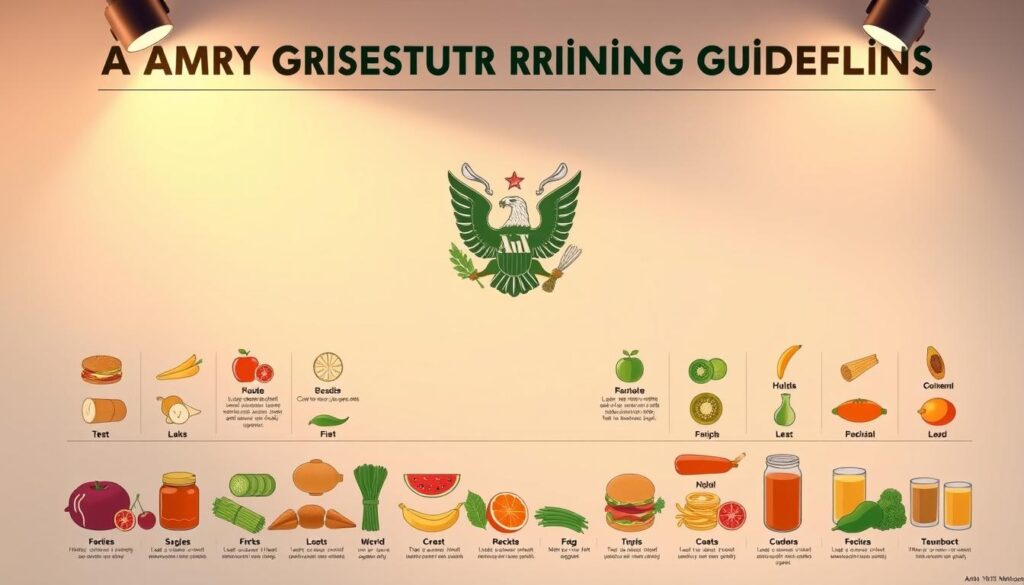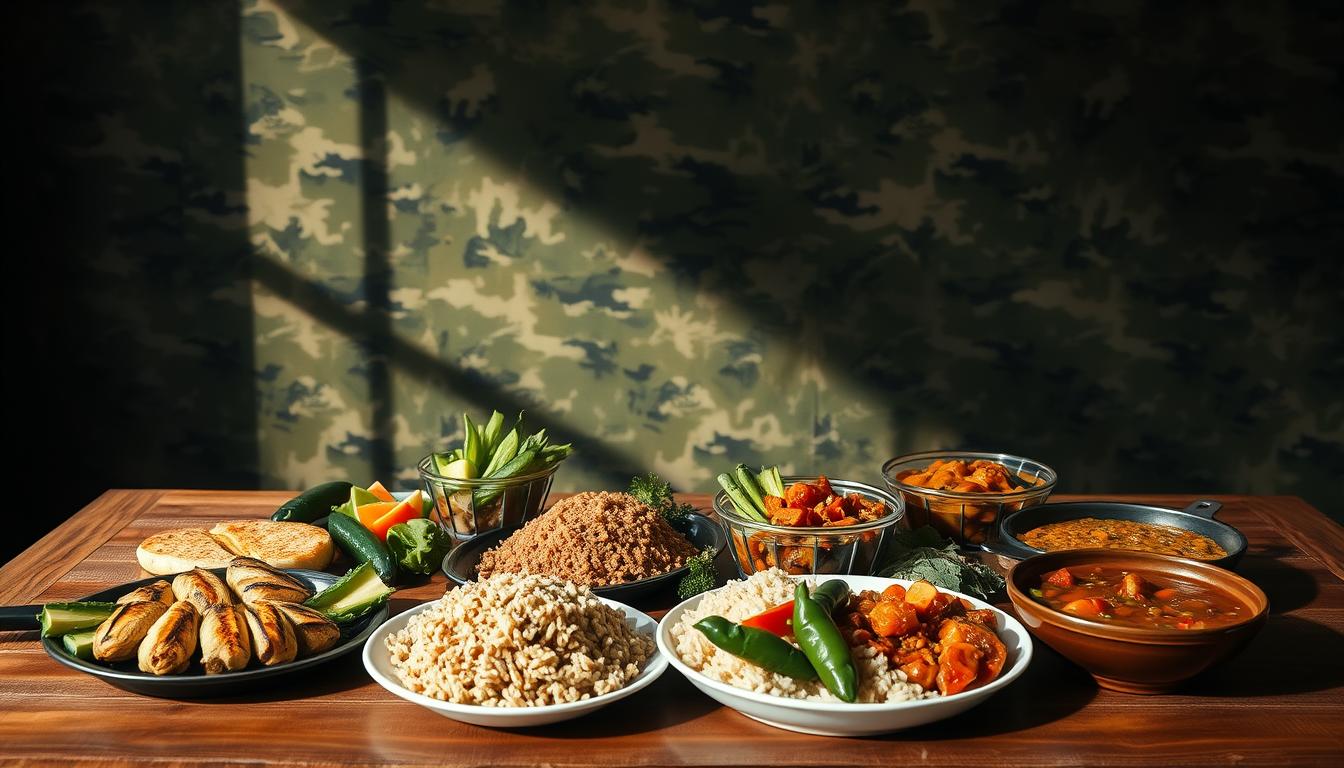Can a well-structured meal plan make a difference in a recruit’s performance during the rigorous 10-week training? The answer lies in the United States Army’s Soldier Fueling Initiative. It’s designed to provide Soldiers with the necessary nutrients to succeed.
The Soldier Fueling Initiative includes DOD nutrition standards, nutritional education, menu development, and healthy food options. It ensures recruits get a balanced diet.
A well-balanced military diet plan gives the fuel needed for energy, muscle repair, and overall health. It helps recruits perform at their best.
Key Takeaways
- Standardized menus ensure recruits receive a balanced diet.
- Nutritional education helps recruits make informed food choices.
- Healthy food options are available to support optimal performance.
- A well-structured meal plan is crucial for recruits’ success.
- The Soldier Fueling Initiative is designed to support Soldiers’ nutritional needs.
Introduction to Army Basic Training Nutrition
A well-balanced diet is key for Army recruits. It gives them the energy to handle basic training’s challenges. Good nutrition helps with recovery and keeps them healthy.
Importance of Nutrition for Recruits
Nutrition is vital for Army recruits’ performance and recovery. A diet full of essential nutrients helps them meet training demands. This includes physical and mental challenges. The 30-day meal plan for soldiers shows the need for carbs, proteins, and fats.
The 2010 Dietary Guidelines for Americans suggest adults eat 45-65% carbs, 15-20% protein, and 20-35% fat. For recruits, this balance is key to handle their high energy needs.

Overview of Army Nutritional Guidelines
The Army has set nutritional guidelines for recruits. These guidelines focus on whole, nutrient-rich foods. This includes fruits, vegetables, whole grains, lean proteins, and healthy fats.
A nutrition expert says,
“A well-nourished soldier is better equipped to perform under stress and recover from the rigors of training.”
This highlights the need to follow the Army’s nutritional guidelines.
| Nutrient | Recommended Daily Intake | Food Sources |
|---|---|---|
| Carbohydrates | 45-65% of daily calories | Whole grains, fruits, vegetables |
| Protein | 15-20% of daily calories | Lean meats, fish, eggs, dairy |
| Fats | 20-35% of daily calories | Nuts, seeds, avocados, olive oil |
In conclusion, following the Army’s nutritional guidelines is crucial. It helps recruits perform and stay healthy during basic training.
Essential Food Groups for Recruits
To perform at their best, recruits need to focus on the right food groups. A balanced diet is key for energy, muscle growth, and health during Army Basic Training.

Carbohydrates: Fuel for Endurance
Carbohydrates are the body’s main energy source. Recruits should eat complex carbs like whole grains, fruits, and veggies for lasting energy. A study shows complex carbs are vital for endurance, releasing glucose slowly.
“Diets rich in complex carbohydrates can improve endurance performance by maintaining glycogen stores.”
Good examples of complex carbs are brown rice, quinoa, and sweet potatoes. These foods are full of fiber, vitamins, and minerals, perfect for recruits.
Proteins: Building Muscles and Recovery
Lean proteins like poultry, fish, and legumes help build and repair muscles. Protein is key for recruits as it aids in muscle repair and growth. A sports nutritionist says, “Protein is a critical component of a recruit’s diet, supporting muscle repair and growth.”
Recruits should eat a variety of proteins, like chicken, beans, and lentils. This supports muscle recovery and growth.
Fats: Essential for Energy and Vitamins
Healthy fats from nuts, seeds, and avocados are vital for vitamins and health. Fats are a rich energy source and help absorb vitamins. As part of a balanced diet, healthy fats are crucial for recruits’ health and performance.
- Nuts and seeds are rich in healthy fats and antioxidants.
- Avocados provide monounsaturated fats that support heart health.
- Fatty fish are a good source of omega-3 fatty acids, which reduce inflammation.
By focusing on these food groups, recruits can optimize their diet for Army Basic Training. This ensures they have the energy and nutrients to perform at their best.
Daily Caloric Needs During Basic Training
To do well in Basic Training, recruits must know how many calories they need each day. The hard work of Army Basic Training burns a lot of energy. Eating the right amount of calories is key for top performance and getting better.
Understanding Energy Expenditure
Recruits in Army Basic Training do lots of hard physical work. This work burns a lot of energy. The number of calories needed each day changes based on age, sex, and how active you are.
The 2010 Dietary Guidelines for Americans say men aged 19-35 need about 3,000 calories a day. Women aged 19-30 need around 2,400 calories a day.
It’s important to remember that energy use isn’t just about burning calories during training. It also includes energy for recovery and keeping the body working right.
Calculating Your Daily Caloric Intake
To figure out how many calories you need, think about your age, sex, weight, and how active you are. A good way is to use a caloric needs calculator or talk to a nutritionist. For more info on food intake and calorie needs, check out Military.com.
The Army suggests eating every 4-6 hours to keep energy up and stay healthy. Eating this often helps avoid getting too hungry and keeps energy steady all day.
Key Considerations for Daily Caloric Needs:
- Age and sex
- Activity level and type of training
- Overall health and nutritional status
By knowing and meeting their daily calorie needs, recruits can do their best in Basic Training. This sets them up for success in their military careers.
Meal Timing and Frequency
Proper meal timing and frequency are key for recruits to keep their energy up during Army Basic Training. A well-planned diet supports health and performance. It helps recruits meet the training demands.
Importance of Eating Regularly
Eating regularly is crucial for energy and muscle recovery. Recruits should eat a balanced meal or snack every 4-6 hours. This keeps them from getting tired and helps them perform well all day.
Regular meals also keep the body healthy by giving it essential nutrients. This is especially important during tough training times when the body needs more nutrients.
Pre- and Post-Workout Nutrition
Pre-workout nutrition gives the energy needed for top performance. Recruits should eat a balanced meal or snack with carbs and protein 1-3 hours before training. This ensures they have enough energy for their workouts.
Post-workout nutrition is also key for recovery. Eating a mix of carbs and protein within 30-60 minutes after training helps refill energy and repair muscles. For more info on getting ready for Army Basic Training, including nutrition tips, visit Preparing for Basic Training.
By focusing on meal timing and frequency, recruits can support their health and performance in Army Basic Training. This means eating regularly, having balanced meals, and paying attention to pre- and post-workout nutrition.
Sample Army Basic Training Meal Plan
Nutrition is key for soldiers in basic training. A good diet gives them the energy to do their jobs and recover well. Here’s a sample meal plan to help soldiers through their training.
Breakfast Ideas to Start Strong
Breakfast is important for the day’s energy. Oatmeal with fruit and nuts is great, with complex carbs, fiber, and healthy fats. Scrambled eggs with whole-grain toast and avocado are also good, offering protein and healthy fats.
Lunch and Dinner Options for Sustained Energy
Lunch and dinner should be balanced with proteins, complex carbs, and veggies. Grilled chicken with quinoa and steamed veggies is a good lunch. Lean beef with brown rice and steamed veggies is a great dinner. These meals keep energy up and help muscles recover.
Healthy Snack Choices During Training
Snacks are key to keep energy up all day. Good choices are fruits, nuts, and energy bars. They’re easy to grab and give a quick energy boost.
Here’s a sample daily meal plan table for a recruit:
| Meal | Food | Nutritional Benefits |
|---|---|---|
| Breakfast | Oatmeal with fruit and nuts | Complex carbohydrates, fiber, healthy fats |
| Lunch | Grilled chicken with quinoa and vegetables | Protein, complex carbohydrates, vitamins |
| Dinner | Lean beef with brown rice and steamed vegetables | Protein, complex carbohydrates, vitamins |
| Snacks | Fruits, nuts, energy bars | Quick energy, vitamins, minerals |
Hydration: The Key to Performance and Recovery
Drinking enough water is key for recruits in Army Basic Training. It helps them perform well and recover faster. The Army has specific guidelines for water intake.
Water Intake Recommendations
The Army says recruits should drink 8-10 glasses of water daily. This keeps them hydrated and helps their bodies recover.
Recognizing Dehydration
Recruits need to know the signs of dehydration. These include headaches, feeling tired, and dizzy. Drinking water often helps prevent dehydration and keeps them performing well. Meal planning should also focus on staying hydrated.
For more tips on eating right during Army Basic Training, check out Health Weight Calculator.


